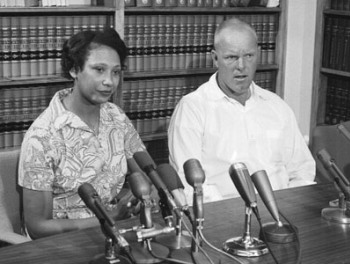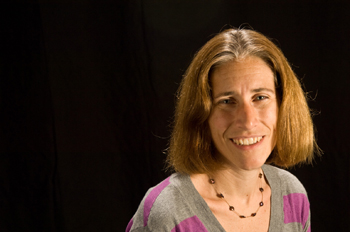Novkov Examines History of Interracial Marriage Laws in Alabama
 |
In 1967 the Supreme Court struck down the ban on interracial marriage in Virginia, after hearing the case of Loving vs. Virginia. Mildred and Richard Loving at a press conference announcing the decision. Richard Loving's lawyers on the eve of their oral argument before the Supreme Court, asked him if there was anything else he wanted them to add to their arguments. He replied, "Tell the Court I love my wife." |
Interracial marriage is common in the U.S. today, notes a 2007 Associated Press story.
As President Barack Obama himself is the child of a white mother and black father, it is easy to forget that only 42 years ago, interracial marriage was still against the law.
A new book by UAlbany professor Julie Novkov addresses the issue of interracial marriage by tracing the history of Alabama's laws�which maintained a ban until 2001. Even at that late date, when the ban was removed from the Alabama constitution, 40 percent of the voters objected.
"The surprisingly controversial vote over removing Alabama's constitutional prohibition on interracial marriage is another proof of what social scientists know: what people will say publicly about race often differs from what they will discuss � and believe � behind closed doors," said Novkov, a professor of political science and women's studies. Novkov�s book, Racial Union: Law, Intimacy, and the White State in Alabama (University of Michigan Press, 2008) recently was picked to receive the 2009 Ralph Bunche Award, given for the best scholarly work in political science that explores the phenomenon of ethnic and cultural pluralism. Ralph Bunche was the first African American to win the Nobel Peace Prize.
"I wrote the book because I believe passionately that we do not live in a post-racial society," said Novkov. "The fundamental message is that Alabama was deeply invested in creating and maintaining a system of white supremacy for generations. The legacy of the system has not collapsed simply because the state has, for the most part, stopped enforcing it."
While most Americans accept the U.S. Supreme Court ruling in 1967 in upholding the legality of interracial marriage in Loving vs. Virginia, just a few weeks ago, a Louisiana justice of the peace rejected an interracial couple's application for a marriage license on the ground that any children they bore would suffer from social isolation. He has since resigned.
 |
Julie Novkov wrote the book because she "believes passionately that we do not live in a post-racial society." (Photo Mark Schmidt) |
"Discriminatory and racially hostile resistance to interracial marriage still exists," said Novkov, who took a closer look at more than 40 cases handled by the state appellate courts of Alabama from 1868 to 1954 involving accusations of interracial intimacy. These cases were not simply challenges by defendants to the regime of anti-miscegenation. "Rather, they were windows into how white supremacy was born and how it developed in Alabama," said Novkov, who teaches constitutional law for undergraduates and graduate students as well as the graduate field seminar in public law for political science students.
While regulation of interracial marriage is about race, it is also about gender, Novkov said. During one period in her study, she found some defendants were able to have their convictions overturned "because they showed convincingly that they had not intended to maintain their intimate relationship or that the sex had happened in the context of prostitution." The judges' opinions suggested the ban on interracial intimacy was as much about preventing the formation of interracial families as it was about generating boundaries between the races. "Feminist theories were very helpful to me throughout the project," said Novkov.
The book challenges the common belief that little political development took place from the end of Reconstruction to the beginning of the Civil Rights Movement. It explains the relationship between race and gender as anti-miscegenation policies defined boundaries between legitimate and illegitimate behaviors and families, Novkov said.
Novkov joined UAlbany from the University of Oregon because of Rockefeller College�s long history of strength and excellence in public law. She grew up in a small town outside of Akron, Ohio, and went to Harvard and Radcliffe, graduating magna cum laude with an A.B., earning a J.D. from New York University School of Law, and an M.A. and doctorate from the University of Michigan.
![]() For more news, subscribe to UAlbany's RSS headline feeds
For more news, subscribe to UAlbany's RSS headline feeds


